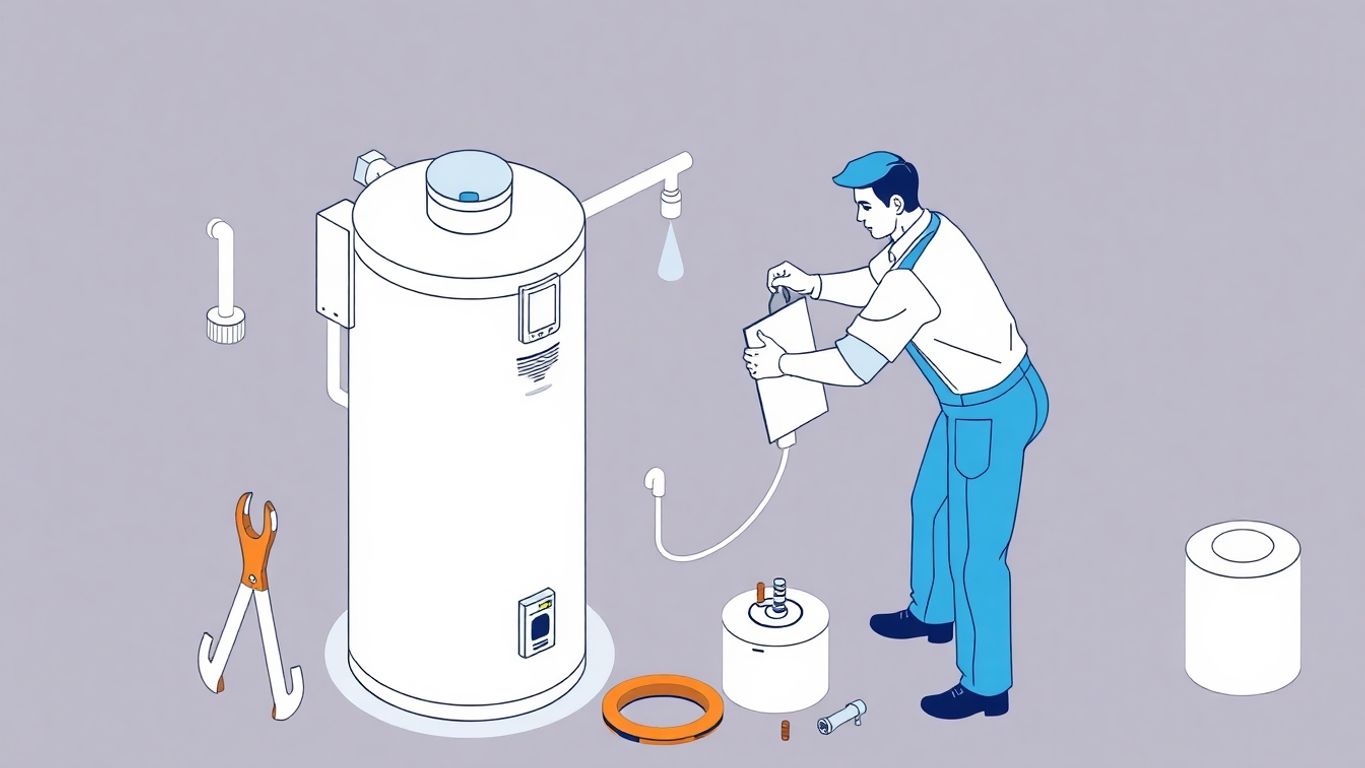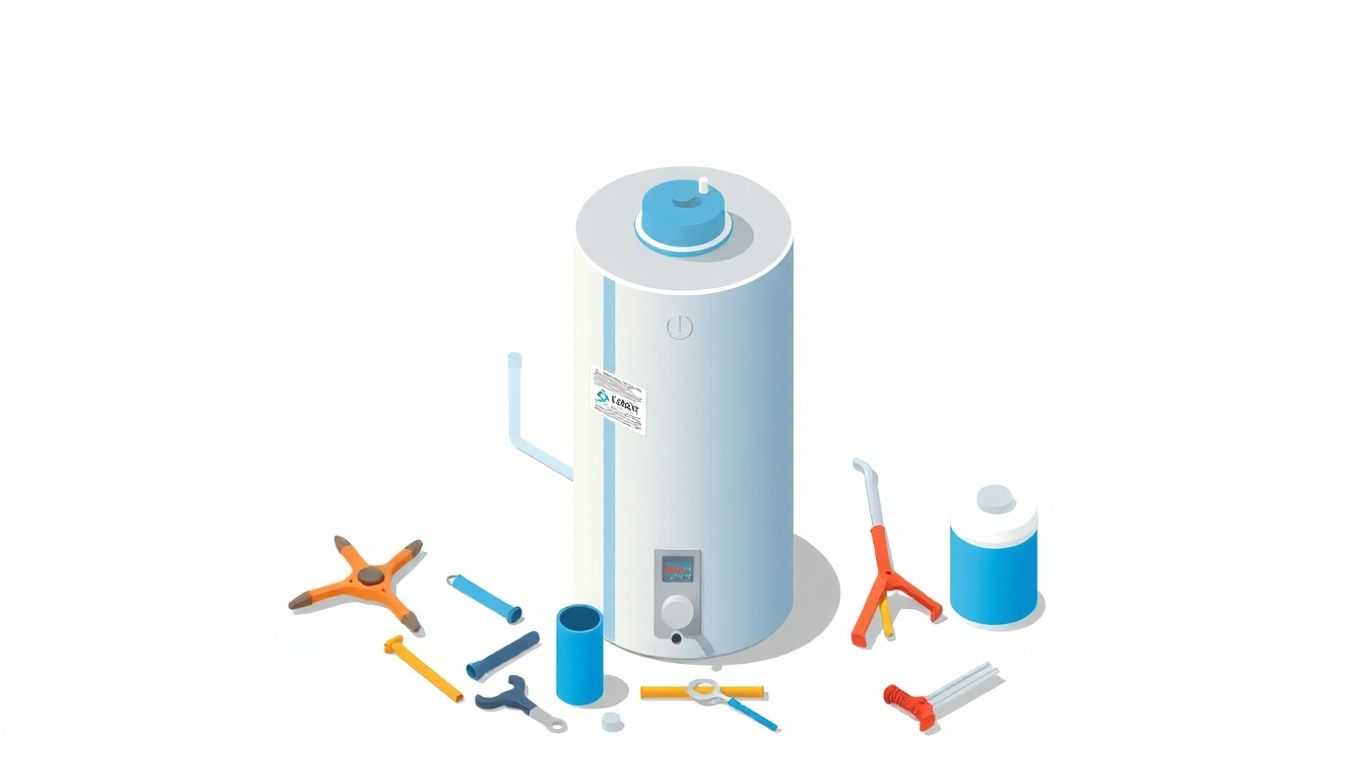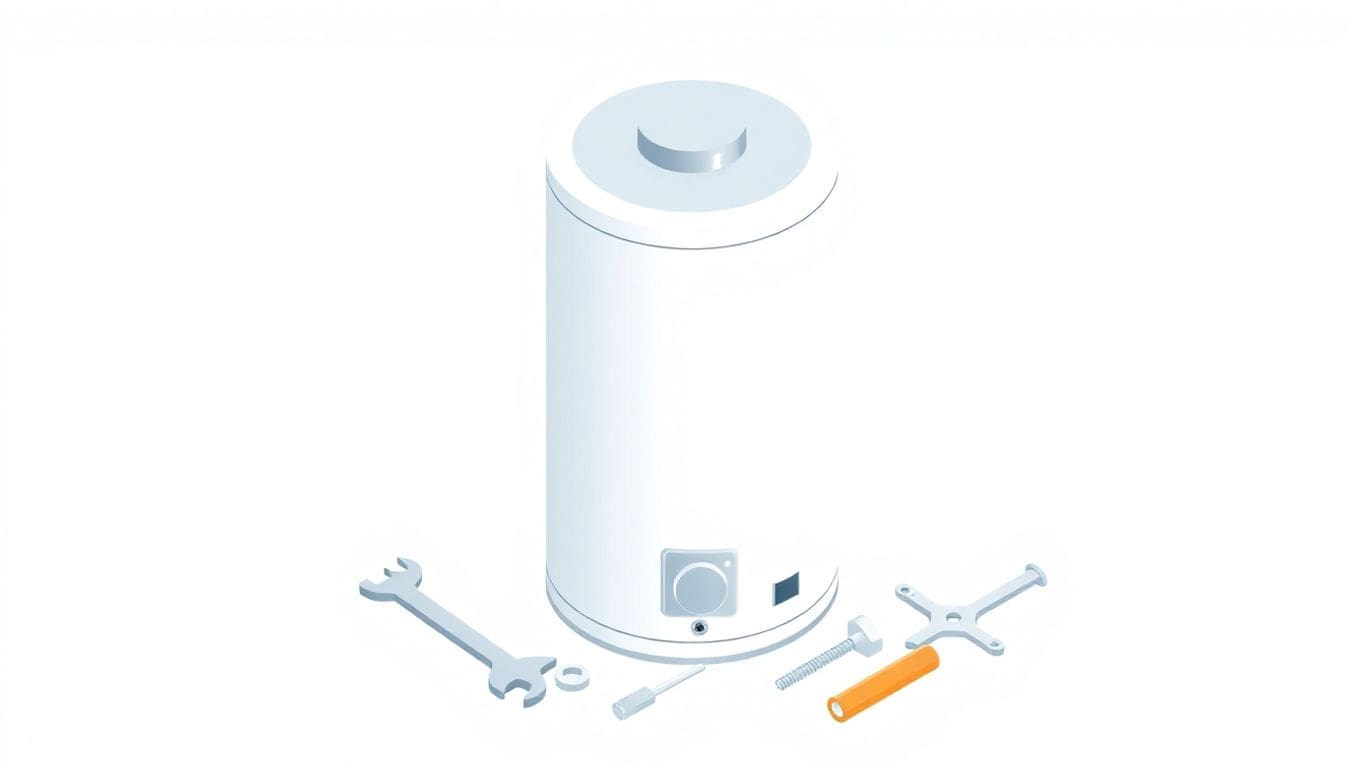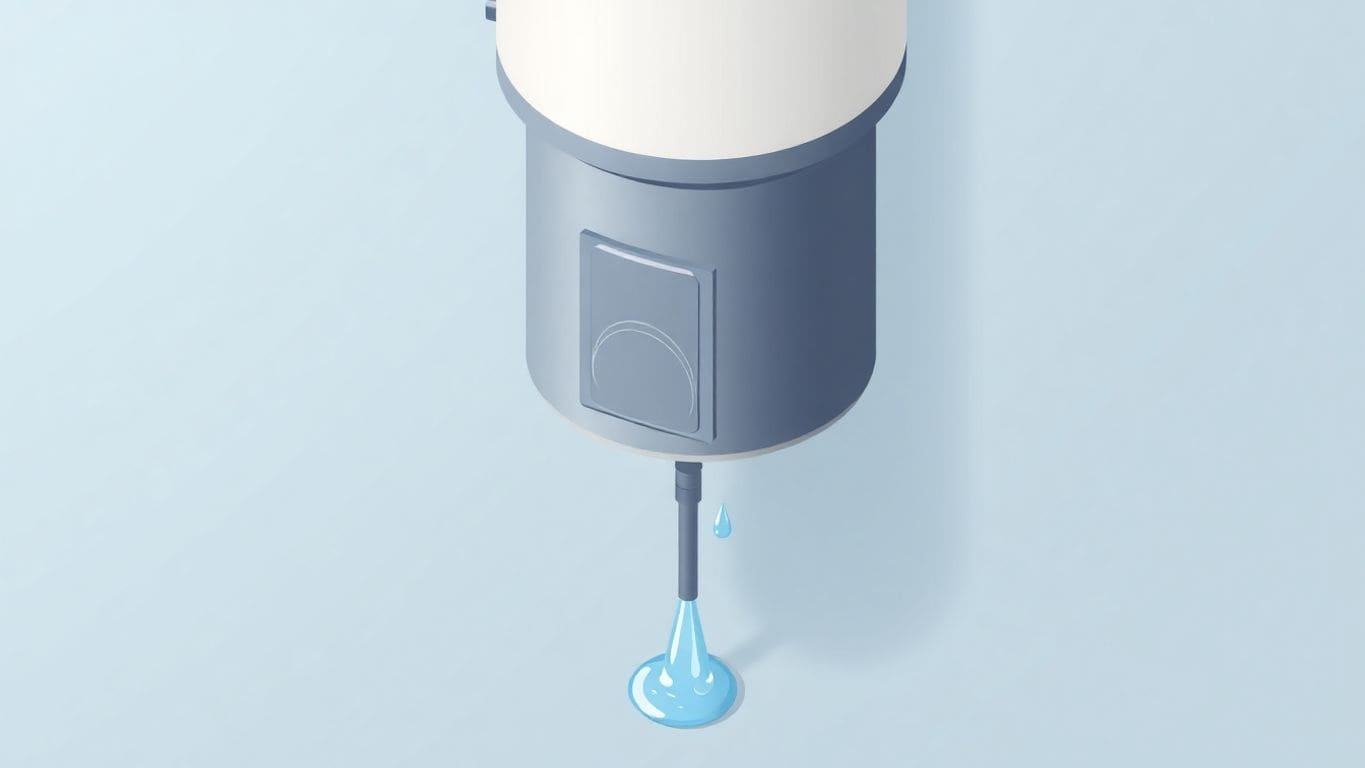If your electric water heater isn’t working right, you might be scratching your head about who to call for repairs. It can be confusing to decide whether to reach out to a plumber, an HVAC technician, or even tackle the problem yourself. This guide will walk you through the common issues, how to find the right repair expert, and what you need to know to get your water heater back in shape.
Electric water heaters are common in homes. They give you hot water for showers, dishes, and laundry. Let’s learn about them.
Electric water heaters can have problems. Knowing the signs is important. Here are some common issues:
Knowing these common issues can help you figure out if you need to call someone for water heater repair.
It’s important to know when your water heater needs help. Here are some signs to watch for:
If you’re going to check your electric water heater, be safe. Always turn off the power to the heater at the circuit breaker before you start. Water and electricity don’t mix! Also:
So, your electric water heater isn’t working right. You might wonder who to call. It’s a good question! Several types of people can fix these. Let’s look at your choices.
You have a few choices for who can fix your electric water heater. The most common are plumbers and HVAC technicians. Electricians can also help, especially if it’s an electrical problem.
Plumbers are usually the first people you should call for water heater problems. They know a lot about water systems and can handle most repairs. Call a plumber if:
Plumbers can also help you decide if you should repair or replace your water heater. They can check for problems like rust or sediment buildup. They can also tell you if your water heater is too old to repair.
HVAC techs usually work on heating and cooling systems. But, some also know how to fix water heaters. They might be a good choice if:
HVAC techs can also help you with regular maintenance to keep your water heater working well. They can check for problems and make sure everything is running smoothly. They can also suggest ways to save energy and lower your bills.
It can be tricky to pick the right person to fix your electric water heater. You want someone you can trust to do a good job. Here’s how to make a smart choice.
When you’re looking for someone to fix your water heater, there are a few things to keep in mind. First, make sure they have the right licenses and certifications. This shows they’ve had the proper training. Also, ask if they’re insured. This protects you if something goes wrong during the repair. Don’t be afraid to ask for proof of these things. It’s your right to know that you’re working with a qualified professional.
Experience matters a lot when it comes to fixing water heaters. Someone who has been doing this for a while is more likely to know how to handle any problems that come up. They’ve probably seen it all before! Ask how long the company has been in business and how many years the technician has been working on water heaters. A seasoned pro can often diagnose and fix problems faster and more efficiently.
Customer reviews can give you a good idea of what to expect from a repair service. Check out sites like Yelp or Google Reviews to see what other people are saying. Look for patterns in the reviews. Are most people happy with the service? Do they mention any specific problems or praises? Keep in mind that not all reviews are real, so take them with a grain of salt. But overall, reviews can be a helpful tool in finding reliable water heater repair services.
Choosing the right repair expert is a big deal. You want someone who is qualified, experienced, and has a good reputation. Take your time, do your research, and don’t be afraid to ask questions. It’s worth the effort to find someone you can trust.

It can be tough finding someone you can trust to fix your water heater. You want a person who knows what they’re doing and won’t charge too much. Here’s how you can find a good repair service.
The internet can be a big help. You can use search engines like Google to find local repair places. Make sure you type in your town to get local results. You can also check sites like Yelp. These sites often have reviews from other people. Just remember that not all online reviews are real, so be careful.
One of the best ways to find a good repair service is to ask people you trust. Do you know anyone who has had their water heater fixed recently? Ask them who they used and if they were happy with the service. Word-of-mouth is often the most reliable way to find a good professional. Don’t be afraid to ask neighbors, friends, or coworkers for their suggestions.
Once you have a few names, it’s time to do some checking. Call each company and ask them some questions. Find out how long they’ve been working and if they have a license and insurance. You can also ask for references from past customers. A good company will be happy to give you this information. Also, pay attention to how they treat you on the phone. Are they nice and helpful? Do they seem like they know what they’re doing? Your gut feeling can be a good guide.
Finding a reliable water heater repair service takes a little time and effort, but it’s worth it. You want someone who will do the job right and not overcharge you. By doing your homework, you can find a professional you can trust.

Is your water heater acting up? It’s important to figure out if a simple fix will do, or if it’s time for a new one. Let’s look at some things to consider.
Sometimes, repairs just won’t cut it. Here are some signs that your water heater might be better off replaced:
Think about the costs of both repair and replacement. Get quotes for both options to compare. Here’s what to keep in mind:
Replacing your water heater can have some great long-term benefits:
Deciding whether to repair or replace your water heater depends on several things. Consider the age of your unit, the frequency of repairs, and the potential long-term benefits of a new water heater. Don’t forget to get quotes for both options to make an informed decision.
So, your water heater isn’t working right. You might be thinking about fixing it yourself. Doing it yourself can save you some money, if you know what you’re doing. Simple fixes, like changing a thermostat, might be okay if you’re good with tools and know a little about electricity. Always turn off the power and water first! If you’re handy and the problem seems small, go for it. Just be honest about your skills. If you don’t know what you’re doing, it’s best to call someone. You can find a local plumber to help.
DIY repairs can be risky if you aren’t careful. Working with electricity and water can be dangerous. You could get shocked or cause a flood. Also, if you mess something up, it could void your water heater’s warranty. Plus, some repairs are just too hard for someone who isn’t a pro. If you’re not sure, it’s always best to call a professional. It’s better to be safe than sorry. Trying to fix something you don’t understand can lead to more damage and higher repair costs in the end. It’s important to assess your skills honestly and know when to call for help.
Hiring a pro has some big pluses. Pros have the training to find problems fast and fix them right. They also know all the safety rules. Plus, they can see other problems before they become big issues. Sure, it costs more at first, but it can save you money later by stopping bigger repairs. Here’s a quick list of benefits:
Hiring someone without experience can lead to more problems. They might misdiagnose the issue or do a poor repair job. This can end up costing you more money and headaches down the road.
It’s important to know what goes into the cost of fixing a water heater. This way, you can plan your budget and avoid surprises.
Several things affect how much you’ll pay to fix your water heater. Knowing these can help you understand the bill.
The average cost to fix an electric water heater can be anywhere from a hundred dollars to several hundred. Simple fixes will usually be cheaper. The exact price depends on the problem and the parts needed.
It’s smart to have a plan for paying for water heater repairs. Here’s how:
It’s a good idea to set aside some money for home repairs. This way, you’re ready when something like your water heater breaks down. Even a small amount each month can help.
Your water heater works hard to give you hot water when you need it. But, like any appliance, things can go wrong. Knowing the common problems can help you spot issues early and maybe save some money on big repairs. Let’s look at some things that might happen with your water heater.
Leaks are a big deal. Even a small leak can cause damage to your floors and walls over time. You might see water around the base of the heater, or maybe it’s coming from a valve or fitting. Sometimes, the tank itself can leak, which is a sign of a bigger problem. If you see any water, it’s important to figure out where it’s coming from and get it fixed fast. Ignoring a leak can lead to mold, rot, and expensive repairs.
Have you ever been in the shower when the water suddenly turns cold? That’s no fun! Inconsistent water temperature can be caused by a few things. Maybe your thermostat isn’t set right, or one of the heating elements could be failing. Another reason could be sediment buildup in the tank. Sediment acts like insulation, so the water doesn’t heat up as well. If your water is sometimes hot and sometimes cold, it’s time to check things out.
Water heaters shouldn’t make a lot of noise. If you hear banging, popping, or hissing sounds, something’s up. Usually, these noises mean there’s sediment in the tank. As the water heats up, the sediment gets moved around and makes those sounds. It’s kind of like popcorn popping, but inside your water heater. While it might not seem like a big deal, that sediment can make your heater work harder and shorten its life.
If you hear strange noises, it’s a good idea to flush your water heater. This gets rid of the sediment and can help your heater run better. You can find instructions online, or call a pro if you’re not comfortable doing it yourself.
Taking care of your water heater can really help it last longer. It’s like taking care of your car; a little work now can save you big headaches later. Plus, regular maintenance can save you money on repairs. Let’s look at some easy things you can do.
Here are some things you can do to keep your water heater in good shape:
Regular maintenance is super important. Doing these simple things can help you avoid expensive repairs and keep your water heater running for a long time.
Pay attention to your water heater. If you notice anything weird, it could be a sign of a problem. Here are some things to watch out for:
Here are some extra tips to help your water heater last longer:
It’s easy to forget about warranties and guarantees when your water heater breaks. But knowing about them can save you money and stress. Let’s look at what you need to know.
When you buy a new electric water heater, it usually comes with a warranty. This is like a promise from the maker that the heater will work for a certain time. Read the warranty carefully to see what it covers. Some warranties cover parts, labor, or both. Also, check how long the warranty lasts. Some are for a few years, while others might be longer.
If your water heater breaks down while it’s still under warranty, the maker might fix it for free or at a reduced cost. You’ll need to follow the warranty’s rules to get the repair covered. This might mean using an approved repair person or sending in some paperwork. Keep in mind that warranties usually don’t cover problems caused by improper use or not keeping up with maintenance.
Keep all your paperwork related to your water heater. This includes the receipt, the warranty, and any repair records. If you need to make a warranty claim, you’ll need these papers to prove when you bought the heater and what work has been done on it. Good records can make the warranty process much easier.
Keeping good records is super important. I learned this the hard way when my washing machine broke down. I couldn’t find the receipt, and the warranty was useless. Now, I keep everything in a file folder!
Water heaters usually work fine, but sometimes things go wrong. Knowing what to do in an emergency can keep you safe and prevent damage to your home.
Not all water heater problems are emergencies. A small drip might be annoying, but a big leak or total failure needs fast action. Here’s how to know if you have a water heater emergency:
If you have a water heater emergency, here’s what to do right away:
Dealing with a water heater emergency can be stressful. Remember to stay calm and follow these steps to keep yourself and your home safe.
When you need help fast, here’s how to find emergency water heater services:
It’s always a good idea to have the number of an emergency plumber saved in your phone, just in case. Being ready can make a big difference when something goes wrong.
If your water heater isn’t heating water, makes odd noises, or is leaking, it might need repairs.
You can try to fix small issues if you know how, but for bigger problems, it’s safer to call a professional.
Search online, ask friends or family for suggestions, and read reviews to find a trustworthy service.
Make sure the technician has the right licenses and experience in fixing electric water heaters.
Repair costs usually range from $150 to $500, depending on the problem.
Turn off the power and water supply, then call a professional right away to prevent further damage.
Yes, hiring a pro can ensure the job is done safely and correctly, saving you time and hassle.
Regularly check for leaks, flush the tank to remove sediment, and check the temperature settings.


